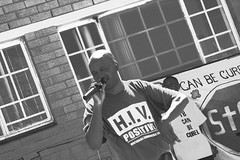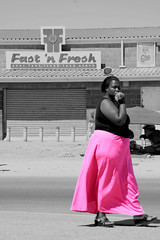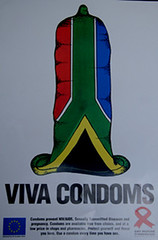That's what he said in that campaign. "I know my status, what about you?", he challenged the audience. Yes, Rodrick knew his status long time ago. He has been living with HIV for 16 years. That status has changed his life forever. It wasn't easy in the beginning as he admitted. Definitely not. It took him years before finally accepted his status. He made peace with life 6 years ago.
 Knowing our status i.e. whether or not we have HIV/AIDS is certainly a frightening, heart-wrecking thing to do. But living with HIV/AIDS without knowing it is far more terrifying. We could endanger our loved ones. And I guess the most terrifying thing of all is to let others know that we have HIV/AIDS. Rodrick has been through all those stages. He even takes thing further by deliberately telling people everywhere about his status in order to help them. He is now actively involved in Treatment Action Campaign, or known as TAC, an organisation that raises awareness and helps people with HIV/AIDS to get proper treatment.
Knowing our status i.e. whether or not we have HIV/AIDS is certainly a frightening, heart-wrecking thing to do. But living with HIV/AIDS without knowing it is far more terrifying. We could endanger our loved ones. And I guess the most terrifying thing of all is to let others know that we have HIV/AIDS. Rodrick has been through all those stages. He even takes thing further by deliberately telling people everywhere about his status in order to help them. He is now actively involved in Treatment Action Campaign, or known as TAC, an organisation that raises awareness and helps people with HIV/AIDS to get proper treatment.
Rodrick is the first HIV positive person I have ever met. I did not expect to see someone like him. He was nothing close to what I imagined how someone with HIV/AIDS should have looked like. He is so full of life and so fun to be with. He is also an excellent public speaker! Though sometimes he gets annoyed quite easily ;-). Rodrick shows me that HIV or AIDS should not stop someone from living a normal life or enjoying things that life offers. He loves dancing. He likes partying. He took us to some parties. We chilled out in Long Street, Capetown. He also cooked for us when Marina and Gladman, my beloved host family, threw a party. He does get tired quite easily but he certainly knows how to enjoy life. He wants to come to Indonesia. Someday, Rodrick! In short, he's living a normal life.
I am sure there are stages in life that one has to go through before accepting things that they cannot change. Those stages can be very difficult. And, those difficult, trying stages can be very long. Life may not be the same again but it is not the end of the world. I know this is easier said than done. But perhaps, like other kind of hardship in life, it would give us a chance to grow stronger and wiser. Perhaps it would also inspire others like what Rodrick has done to many and certainly to me. Dankie baia, Rodrick!
1 December 2006 is AIDS' day
 It was one afternoon in Samora, a township in Western Cape, South Africa. I was sitting, waiting for the TB & HIV/AIDS campaign to start when this lady with her long, bright, pink skirt caught my eyes. Samora is a place for black South African. It's less than half an hour drive from Capetown. Apartheid has long gone but surprisingly people are still flocking based on their colours. Certain areas are dominated by white people and others are dominated by either black or coloured people. I hate using this term but you cannot help it when you are in South Africa. Somehow colours seem still matter to them. But I guess this area segregation is mostly due to the economy conditions and the land/property prices. Many black people could not afford houses in expensive areas. So, Samora is a "black area". And, you don't just go and wander around in areas like that. It is not safe, so I was told. I wasn't really afraid but Rodrick, that loving HIV/AIDS activist, watched over my back closely while we were there. He never let me off his sight. Well, it is always wise to listen to the locals, isn't it?
It was one afternoon in Samora, a township in Western Cape, South Africa. I was sitting, waiting for the TB & HIV/AIDS campaign to start when this lady with her long, bright, pink skirt caught my eyes. Samora is a place for black South African. It's less than half an hour drive from Capetown. Apartheid has long gone but surprisingly people are still flocking based on their colours. Certain areas are dominated by white people and others are dominated by either black or coloured people. I hate using this term but you cannot help it when you are in South Africa. Somehow colours seem still matter to them. But I guess this area segregation is mostly due to the economy conditions and the land/property prices. Many black people could not afford houses in expensive areas. So, Samora is a "black area". And, you don't just go and wander around in areas like that. It is not safe, so I was told. I wasn't really afraid but Rodrick, that loving HIV/AIDS activist, watched over my back closely while we were there. He never let me off his sight. Well, it is always wise to listen to the locals, isn't it?
 Yes, it's a picture of a condom. For those who recognize it, yes it is the national flag of the Republic of South Africa (RSA). It was one of the many interesting posters about HIV/AIDS that I saw in day hospital in Mitchell's Plain, Western Cape, South Africa. I was startled to see how candid and straightforward that poster was. One could also easily spot other interesting and creative posters, billboards, pamphlets or other campaigning tools for fighting HIV/AIDS in the streets of Western Cape, in the buildings, public places or even churches. Another billboard on the street says "HIV/AIDS loves skin to skin". They must be really serious about fighting HIV/AIDS. How could they not be if approximately 5,3 million out of 43 million people of South Africa are currently living with HIV/AIDS?
Yes, it's a picture of a condom. For those who recognize it, yes it is the national flag of the Republic of South Africa (RSA). It was one of the many interesting posters about HIV/AIDS that I saw in day hospital in Mitchell's Plain, Western Cape, South Africa. I was startled to see how candid and straightforward that poster was. One could also easily spot other interesting and creative posters, billboards, pamphlets or other campaigning tools for fighting HIV/AIDS in the streets of Western Cape, in the buildings, public places or even churches. Another billboard on the street says "HIV/AIDS loves skin to skin". They must be really serious about fighting HIV/AIDS. How could they not be if approximately 5,3 million out of 43 million people of South Africa are currently living with HIV/AIDS?
But, a condom wrapped with a national flag? Aren't they being a little too serious about it? A national flag is a symbol of a country. It is associated with respect, heroism, nobility, pride. There are even certain rules and regulation on how to treat the flag that one may get punished for violating the rules. And, what is a condom? A condom symbolizes a very private matter between 2 individuals which is not much talked openly in public i.e. sex. In this case, a condom is a symbol of protection from getting HIV/AIDS. So when a condom and a national flag are put together what exactly does it tell us? Firstly, an immersion between a private and a public matter just took place. Condoms now become a public issue. Secondly, it simply shows how serious the people of RSA that they are all, as represented by the flag, involved in dealing with the HIV/AIDS problem. I don't even dare to dream of seeing such kind of poster in Indonesia. Why?
It goes without saying that condoms mean sex. In many countries like Indonesia, sex is very much still regarded as a taboo that any discussions about it are better kept tightly in the closet. One may argue that it would be far unnecessary to make such a poster here in Indonesia because the percentage of people who are living HIV/AIDS is almost nothing compared the RSA. The official number indicates that there are only about 130,000 people out of 225 million who are HIV/AIDS positive. Also, the majority of people living with HIV/AIDS here in Jakarta got infected through drugs injections instead of sexual intercourse. But the figure, like other (official) figures, is probably just the tip of the iceberg. Perhaps we should stop deceiving ourselves that we would never be like any African countries when it comes to HIV/AIDS. (Or other issues like environmental destruction, poverty, hunger, etc.) What makes us so special that we think we will not be like them if we do not start taking things seriously?
Nevertheless, I agree that perhaps that kind of poster would be way too provocative for most Indonesians. The socio-political cost to have that kind of poster hanging in public places would probably outweigh the benefits. There is a possibility that it may even rouse a social unrest should the conservative, puritan groups decide to blow up the issue. So, the question is how the Indonesians do the campaign about sexual diseases? It is certainly a problematic issue in itself. There are always other benign, subtle, tactful ways of doing the campaign but we could not possibly talk about preventing sexual diseases (particularly HIV/AIDS) without involving condoms in conversation. The thing is, promoting condoms to unmarried couples or teenagers might be seen as endorsing free sex. In country like Indonesia where sex is firmly tied with morality, this would raise some problems. Some people may argue that condoms would be unnecessary if only people stay faithful to their spouses. Yes, but there is a "big if" in that argument. If all people behave the way they should, the world would be so free of problems. Last time I check, the world is not like that. Another reality check shows that a lot of singles and teenagers in Indonesian big cities are no longer the way they used to be years ago.
Promoting condoms in Indonesia is obviously not an easy thing. It has a lot to do with cultural and moral values. But should we blind ourselves with false hope that everyone is so religious and of high moral standard that s/he would never do pre- or extra-marital sex? Or should we start seeing the face of reality and deal with it? The point is not about having that sacred red-and-white flag wrapped a condom. It is about the attitude in dealing with the problems. Would we dare to claim that we have been truthful and realistic in dealing with the many problems that we have as the South Africans are doing with HIV/AIDS?
Nelson Mandela : "Let us give publicity to HIV/AIDS and not hide it, because [that is] the only way to make it appear like a normal illness."
 Knowing our status i.e. whether or not we have HIV/AIDS is certainly a frightening, heart-wrecking thing to do. But living with HIV/AIDS without knowing it is far more terrifying. We could endanger our loved ones. And I guess the most terrifying thing of all is to let others know that we have HIV/AIDS. Rodrick has been through all those stages. He even takes thing further by deliberately telling people everywhere about his status in order to help them. He is now actively involved in Treatment Action Campaign, or known as TAC, an organisation that raises awareness and helps people with HIV/AIDS to get proper treatment.
Knowing our status i.e. whether or not we have HIV/AIDS is certainly a frightening, heart-wrecking thing to do. But living with HIV/AIDS without knowing it is far more terrifying. We could endanger our loved ones. And I guess the most terrifying thing of all is to let others know that we have HIV/AIDS. Rodrick has been through all those stages. He even takes thing further by deliberately telling people everywhere about his status in order to help them. He is now actively involved in Treatment Action Campaign, or known as TAC, an organisation that raises awareness and helps people with HIV/AIDS to get proper treatment.
